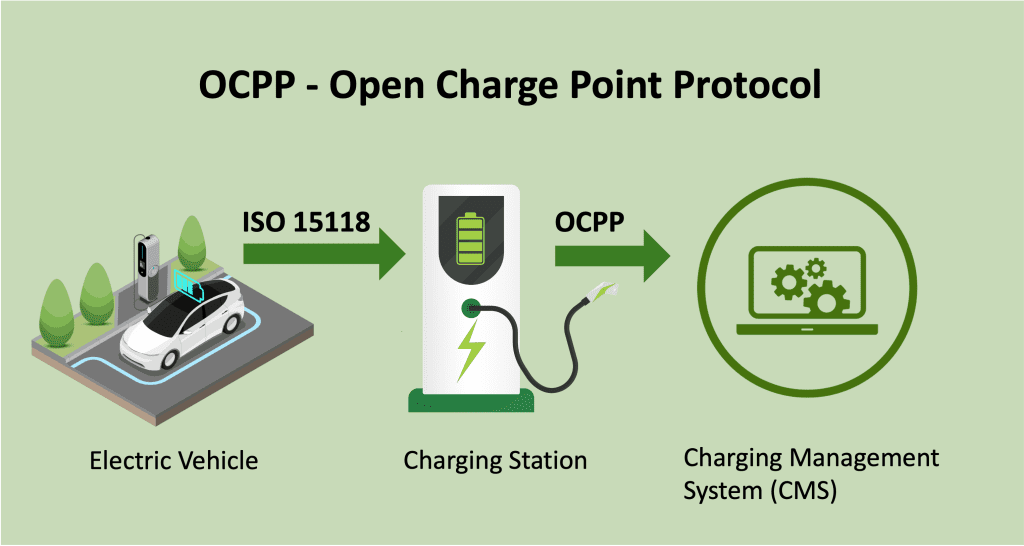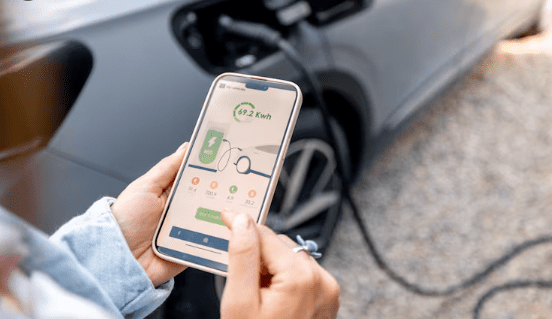With the electric vehicle (EV) market expanding rapidly, infrastructure for charging is advancing just as fast. One of the key technologies powering this ecosystem is the Open Charge Point Protocol (OCPP), a widely accepted open standard that ensures seamless communication between charging stations and back-end systems. In this blog, we’ll explore what OCPP is, its benefits, and its comparison with other EV protocols like OCPI (Open Charge Point Interface).
Table of Contents
What is OCPP ?
The Open Charge Point Protocol (OCPP) is a communication standard that enables interoperability between EV charging stations and back-end management systems. Created by the Open Charge Alliance, it ensures that charging stations from different manufacturers can communicate with the central systems used by charge point operators (CPOs). The most popular versions of OCPP include OCPP 1.6, which introduced features like smart charging, and OCPP 2.0.1, which added advanced security features and support for ISO 15118, a communication standard that allows plug and charge functionality for EVs.
Open Charge Point Protocol is essential for building a flexible, scalable, and future-proof EV charging network. By adhering to an open protocol, CPOs avoid vendor lock-in and have the flexibility to choose different hardware and software providers that suit their operational needs.

Who manages OCPP?
The Open Charge Alliance (OCA) is a prominent global consortium formed by leaders in the public and private sectors of the electric vehicle (EV) infrastructure industry. Established in 2014, the OCA aims to promote and develop open standards that facilitate interoperability in EV charging networks. One of its key contributions is the Open Charge Point Protocol, which serves as a standardized communication protocol between charging stations and management systems.
The history of Open Charge Point Protocol traces back to 2009, reflecting the growing need for a unified approach to EV charging technology. Over the years, OCPP has evolved through several milestones, enhancing its functionality and adoption across the industry. The alliance works collaboratively with various stakeholders, including manufacturers, network operators, and governmental bodies, to ensure that the standards set forth are widely implemented and adhered to.
Key Features of OCPP
Interoperability:
Open Charge Point Protocol ensures that charging stations from different manufacturers can work together, communicating seamlessly with a central back-end system.
Scalability:
As the EV market grows, OCPP enables network operators to easily scale their infrastructure, adding new charge points without worrying about compatibility issues.
Smart Charging:
Open Charge Point Protocol supports load management and dynamic pricing, optimizing energy consumption and balancing demand with available grid capacity.
Security:
Newer versions of OCPP, such as OCPP 2.0.1, include advanced security features that protect charging infrastructure from cyber threats, ensuring data integrity and system reliability.
Plug and Charge:
With support for ISO 15118, OCPP allows drivers to simply plug their vehicle into the charging station without needing to manually authenticate or initiate a charging session.
Benefits of OCPP
The adoption of Open Charge Point Protocol brings numerous advantages to the EV charging ecosystem:
1. Vendor Flexibility
One of the biggest benefits of OCPP is the freedom to choose. Charging stations using proprietary protocols can lock operators into using only their software and hardware. Open Charge Point Protocol breaks this barrier by enabling interoperability, ensuring operators can select the best solution from different manufacturers. This helps in reducing costs and increasing operational flexibility.
2. Future-Proofing
The scalability of OCPP makes it future-proof. As EV adoption increases, the number of charging stations will need to grow. Open Charge Point Protocol’s open nature ensures that charging networks can scale without being limited by vendor-specific infrastructure. Furthermore, as new versions of the protocol are developed, they can be integrated into existing systems without requiring expensive overhauls.
3. Smart Charging
Open Charge Point Protocol supports load management and smart charging, helping charge point operators to distribute available power efficiently. In times of high demand, charging stations can use OCPP to dynamically adjust charging speeds, ensuring that the grid isn’t overloaded. This functionality also helps operators take advantage of variable pricing, offering lower charging costs during off-peak hours.
4. Enhanced Security
OCPP 2.0 and above include strong security protocols. The introduction of features like encryption and digital certificates ensures that data exchanged between charging stations and back-end systems is protected from unauthorized access. This is critical for maintaining trust in EV charging networks and ensuring compliance with cybersecurity standards.
5. Seamless Integration with Renewable Energy
Open Charge Point Protocol is compatible with energy management systems that integrate renewable energy sources, such as solar or wind. This means that EV charging stations can be part of a smart grid, using renewable energy during peak production times, which contributes to sustainability and cost savings.
Why is OCPP-Compliance Important?
OCPP-compliance is essential for effective EV charging infrastructure. It ensures interoperability among charging stations from different manufacturers, preventing vendor lock-in and allowing charge point operators (CPOs) to select optimal technology solutions. Compliance also supports scalability, enabling networks to expand without major system modifications as demand grows.
Furthermore, OCPP-compliance enhances security and data integrity, safeguarding sensitive information during charging sessions. Ultimately, investing in OCPP-compliant solutions is crucial for creating a robust, efficient, and adaptable EV charging network .
OCPP vs OCPI: What’s the Difference?
While OCPP and OCPI (Open Charge Point Interface) are both communication protocols used in the EV charging infrastructure, they serve different purposes. Let’s break down the core differences:
Communication Focus
- OCPP: Focuses on the communication between EV charging stations and central management systems. It ensures that charge points can be monitored, controlled, and maintained remotely by the operator.
- OCPI: Primarily concerned with enabling interoperability between different EV charging networks. OCPI allows drivers to roam between various charging networks seamlessly, using just one account. It handles billing, authentication, and charging session details, enabling a smoother experience for the end-user.
Use Cases
- OCPP: Used by charge point operators (CPOs) to manage their network of stations. It facilitates communication regarding station status, energy consumption, and session data.
- OCPI: Used to allow communication between CPOs and eMobility Service Providers (EMSPs), making it easier for drivers to access charging services across different networks.
Roaming Capabilities
- OCPP: Focuses on ensuring that charging stations can communicate with their own back-end systems, but does not facilitate network roaming.
- OCPI: Designed to enable roaming, allowing EV drivers to access multiple networks using a single account. This makes it easier for drivers to charge their vehicles anywhere, regardless of network or country.
Integration with Other Technologies
- OCPP: Supports features like smart charging, load balancing, and integration with renewable energy sources. It ensures that charge point operators can manage their networks efficiently.
- OCPI: Focuses more on the user experience, ensuring that billing, tariffs, and other essential details are communicated seamlessly between networks and presented to the user.
How OCPP Powers the Future of EV Charging
As more governments and organizations push for the electrification of transport, Open Charge Point Protocol will play a pivotal role in ensuring that EV charging networks remain flexible, secure, and scalable. By adopting this open protocol, charge point operators can build robust and future-proof networks, ensuring interoperability between devices and avoiding vendor lock-in.
Moreover, the integration of smart charging technologies and renewable energy through OCPP will further enhance the sustainability and cost-effectiveness of EV charging infrastructure. This will be critical as the demand for EV charging increases globally.
ElectreeFi’s EV Charging Management Platform
ElectreeFi offers a cutting-edge EV Charging Management Platform that fully integrates with OCPP, allowing charge point operators (CPOs) to monitor and manage charging infrastructure seamlessly. With ElectreeFi’s platform, operators can effortlessly monitor charging points, track transactions, and keep a real-time check on charger statuses.
The platform supports smart charging, ensuring that energy usage is optimized based on demand, while also maintaining compliance with Open Charge Point Protocol standards for maximum interoperability. This means operators can scale their infrastructure without being tied to specific hardware vendors, offering flexibility and cost savings.
Whether you’re looking to enhance security, improve operational efficiency, or future-proof your EV charging network, ElectreeFi’s OCPP-enabled platform provides the tools necessary for effective management and scalability. For more details, you can explore ElectreeFi’s comprehensive suite of EV solutions, all designed to enhance your charging ecosystem’s performance and reliability.
Conclusion
In summary, Open Charge Point Protocol is a key enabler of the modern EV charging ecosystem. It offers several benefits, including interoperability, scalability, and security, while also supporting advanced features like smart charging and plug and charge functionality. By adopting Open Charge Point Protocol, charge point operators can future-proof their infrastructure, ensuring flexibility and vendor independence.
Additionally, understanding the difference between OCPP and OCPI can help stakeholders in the EV industry make informed decisions about which protocols to adopt based on their needs. While OCPP focuses on managing the charging infrastructure, OCPI ensures seamless roaming and interoperability between different networks, enhancing the EV driver experience.
Looking to enhance your EV charging operations with OCPP-compliant solutions?
All of our EV charging stations are fully OCPP-compliant, ensuring seamless integration and communication across your charging network. Share your specific needs with us, and we’ll customize the ideal charging solution tailored just for you. Contact us today!





